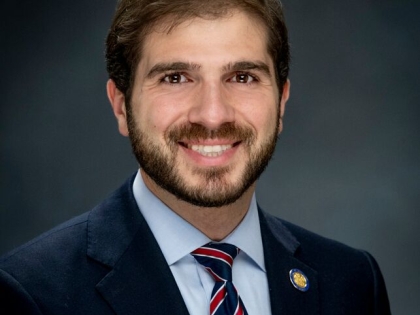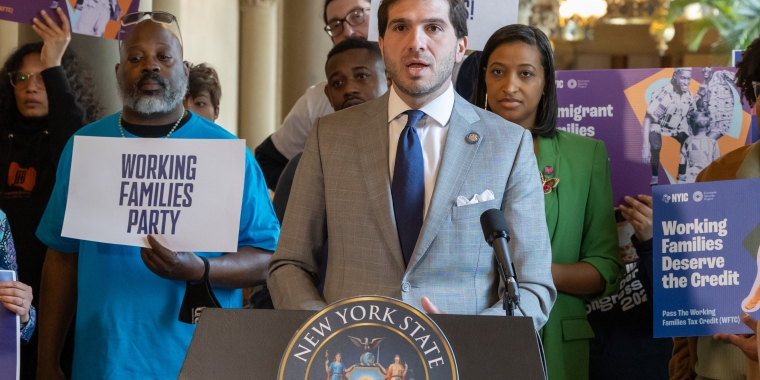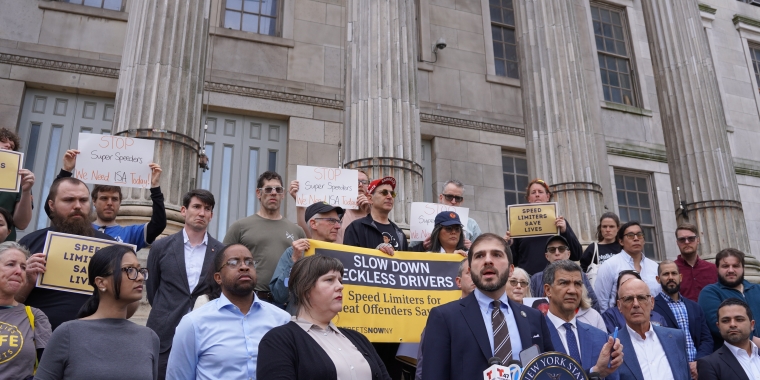
Brooklyn lawmakers seek to create hate crime exemption in bail reform law

People marched across the Brooklyn Bridge on Jan. 5 in solidarity with the Jewish community after a recent spike in anti-Semitic attacks. Photo: Eduardo Munoz Alvarez/AP
Following a recent spike in anti-Semitic incidents across the city, a pair of Brooklyn lawmakers have moved to amend the state’s newly enacted bail reforms by making hate crimes bail-eligible.
The bills — introduced last week in the State Senate and the Assembly by Sen. Andrew Gounardes and Assemblymember Simcha Eichenstein — would amend the current law to allow a judge to set bail for someone who has been accused of committing a hate crime. This would serve as an amendment to the state’s brand new bail laws, which went into effect on Jan. 1. The reforms eliminated cash bail and pretrial detention for those accused of committing a range of misdemeanors and non-violent felonies, including if they were bias motivated.
“This is something that I think should have been included in the original bail negotiations last year but wasn’t,” Gounardes told the Brooklyn Eagle. “And, as we’ve seen over the last couple of weeks and in the data over the last year, incidents of hate crime — not just to the Jewish community but within others as well — have risen. I think that this highlights the need to have some ability to evaluate these cases on a one-by-one basis, especially because hate crimes, which are meant to terrorize an entire group of people, can have a greater impact on public safety.”
Eichenstein, whose district encompasses parts of Midwood and Borough Park, a pair of Brooklyn neighborhoods with large Jewish communities, contended that those who commit hate crimes “constitute a category of their own.”
“Their crimes are fueled by an inner hateful passion that is often irrational, uncompromising, and unstoppable,” he said. “For the sake of the victims and for all New Yorkers, let’s safeguard all our communities by including hate crimes in the list of offenses of which a judge has the discretion setting bail.”
The Anti-Defamation League’s 2018 audit of anti-Semitic incidents in New York, released earlier this year, showed a 55 percent increase in anti-Semitic assaults in 2018, all of which occurred in New York City. As of October, there were 323 hate crimes across the five boroughs reported in 2019, an increase of 33 percent from the same time period in 2018. As of Dec. 26, there were 183 reported anti-Semitic hate crimes in New York City, according to Borough President Eric Adams’ office — a 22 percent increase over last year, and a 38.6 percent increase over the same period in 2016.
Bail reform faced opposition well before Jan. 1, with critics calling it a “catch-and-release” system. After the reforms took effect, opponents used the case of Tiffany Harris as an example. Harris, 30, was first accused of slapping three Orthodox Jewish women in Crown Heights over Hanukkah. She was arrested and released twice in three days — the second time for allegedly punching a woman in Prospect Heights — right before the new year.
According to the New York Post, Brooklyn prosecutors did not request bail for Harris, whose repeated releases occurred prior to the enactment of the new bail reforms. Sources told the outlet that they thought the request would have been denied, or that Harris would have just been released come Jan. 1.
Though Eichenstein and Gounardes are on the same page about a hate crime exception to bail reform, they staked out different positions on the scale of the problem.
“I fear that the trend of criminals who commit heinous, violent crimes being released onto the streets without bail could become the new normal in New York unless we rectify the law to consider perpetrators of hate crimes in a separate category, to be arraigned under the previous system of pretrial monetary bail or pending a judge’s discretion,” Eichenstein said in a statement.
Gounardes offered a more nuanced explanation.
“A lot of the cases coming out in the tabloids say so-and-so was charged with manslaughter but what these papers are leaving out is that, even under the current law, most of these people were eligible for bail and either the prosecution didn’t ask for it or the judge didn’t set it,” the state senator told the Eagle.
Still, Gounardes maintained Monday that the new bail reforms are important to the integrity of the criminal justice system. “The old system was not working,” he said. “Anyone who had access to money could pay their bail and be out, pending trial. You have people like Harvey Weinstein who would get out, but people caught stealing quarters from the laundromat were held because they couldn’t come up with $1,000 before a trial.”
The legislation, passed by lawmakers in April 2019, was introduced in an effort to update bail laws that hadn’t changed since the early 1970s, and in an attempt to help those who couldn’t afford bail from languishing in jail.
“There are a large number of nonviolent offenses that people should not be contained for,” Gounardes told the Eagle.
The proposal from Gounardes and Eichenstein isn’t the only measure to come out in Albany since the reform’s enactment.
A bill sponsored by Republican State Sen. James Tedisco of upstate New York aims to allow “greater judicial discretion in setting bail for defendants who are deemed dangerous, and who pose a threat to public safety” — something, Gounardes said, that was omitted from the recent reforms to maintain a person’s presumed innocence until trial. Tedisco’s bill was referred to committee last week.
Another bill, sponsored by state Sen. Anna Kaplan, hopes to establish a pretrial mental health and substance abuse evaluations and a relevant bail fund.
In the meantime, Gounardes said he hopes his and Eichenstein’s bills pertaining to bail eligibility for hate crimes will come to pass, and quickly. “I think there’s a real opportunity to fix the law here,” he said.
Gov. Andrew Cuomo has said he would support adding hate crimes to a list of offenses for which a judge can set bail, as has Senate Majority Leader Andrea Stewart-Cousins. Attorney General Letitia James has also said the new bail laws should be revisited.
However, supporters of the new bail laws have warned against walking the reforms back, fearing that giving judges more discretion to hold defendants who have not yet been convicted of a crime could backfire, causing jail populations to balloon. Brooklyn Defender Services, which advocated for bail reform and the borough-based jail plan, also cautioned that stepping back on the reforms could disrupt the plan to close Rikers.
One advocate for the new bail reforms said opening the new laws back up for change would be premature.
“We’re concerned with the rush to reopen the laws and change them because, one, it seems incredibly premature. These laws haven’t even been fully implemented yet,” Gabriel Sayegh, co-executive director of the Katal Center for Health, Equity, and Justice, told the Eagle Tuesday.
“The second thing is that, when folks say they want to open the law and add new crimes to be bail eligible, that’s not really what they mean. What people are really saying is they want people to be in jail pre-trial. That’s what it boils down to. When you make a crime bail eligible, what that does is allow a person’s financial resources to become the benchmark — and we think that’s problematic.”
Sayegh said he’d rather see legislators invest in the implementation of mental health services and other types of community support, instead of adding more crimes to the bail list.
Gounardes, one of four co-sponsors on Kaplan’s new bill seeking pretrial mental health services, echoed Sayegh about the need for greater mental health services within the criminal justice system.
“[Under that bill,] we’re getting people that are a danger to themselves and others the help that they need,” Gounardes said. “In so many of these cases, these aren’t hardened criminals — these are individuals that do not belong in a prison. They belong in some sort of treatment center.”
Additional reporting by Mary Frost.
Correction (Jan. 17 at 12 p.m.): An earlier version of this story misstated Brooklyn Defender Services’ stance on the jail plan. The organization did not take a stance. The story has been updated and the Eagle regrets the error.


